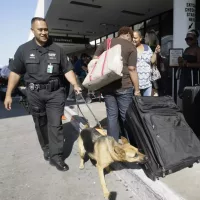
A jury has awarded former Los Angeles police K-9 handler Mark Sauvao who sued the city alleging that his supervisors retaliated and discriminated against him in part because of his Samoan ancestry.
Sauvao alleged he was unfairly punished after he reported some of his colleagues had called him names such as “cannibal” and “barefoot coconut tree-climber.”
One supervisor also reportedly referred to him as being Tongan; Sauvao took the comment as an affront given the bitter early history of war and enslavement between Samoa and Tonga.
Sauvao, who is still with the department, also alleged that officers spread false rumors that he tried extorting fellow K-9 handlers by refusing to train them, unless they gave him their overtime hours.
The city can still challenge the size of the jury award.
From 2005 to 2017, Sauvao was assigned to the department’s elite bomb detection K-9 unit. The 30-year LAPD veteran said his troubles began several years after his promotion to dog trainer, which came with extra pay and benefits.
After learning of the rumors about him, Sauvao said he demanded that the unit’s commander, Lt. Raymond Garvin, intervene and launch an investigation into the officers spreading them. Neither happened, he alleged.
Sauvao said he eventually brought the matter up to Capt. Kathryn Meek of the Emergency Services Division, which oversees the K-9 unit and the bomb squad. Instead of investigating his reports, Sauvao said, internal affairs detectives showed up to search his locker several months later, which he believed was in retaliation for making his earlier complaints.
Sauvao said his request to contact a police union representative after the search was denied. He was later ordered to undergo psychiatric testing and eventually transferred to a less desirable assignment that caused him to be separated from his police K-9 named Pistol, according to the lawsuit.
Sauvao’s attorney, Matthew McNicholas, said the award was the latest he has won in cases involving members of that K-9 unit. Two other cases from around 2008 led to jury awards of $3.6 million and $2.2 million, respectively, he said.
That the same unit continues to have problems 15 years later suggests a lack of oversight, he said.



